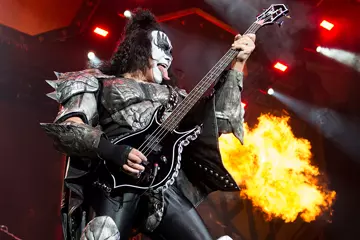Goran Bregovic's music is as eclectic and varied as the almost constantly changing geographical location in which he was raised. Born in Sarajevo, then a part of what was known as Yugoslavia, to Croat and Serbian parents, he was immersed in the myriad cultures and sounds emanating from the 'Jerusalem of the Balkans', a great deal of which have come to influence his wide-ranging, almost orchestral sound.
"Yugoslavia, as the country in which I grew up was called, was a Frankenstein-like country made up of pieces that sometimes don't fit well together," he explains to The Music. "My music is certainly Frankenstein-like also, because it's under influence of elements that, elsewhere, would be impossible to blend."
"My music is certainly Frankenstein-like also, because it's under influence of elements that, elsewhere, would be impossible to blend."
Coming to prominence in the mid-'70s, as guitarist for Yugoslavian rock band Bijelo Dugme, Bregovic today is a renowned composer, having penned scores for dozens of films as well as releasing a slew of albums under his own name. His music takes in elements of Romani, Croatian and Serbian traditional music and melds it with a more modern popular motif, an initially odd-sounding combination, but one which has won him great acclaim the world over. Australia is no exception, where in February, he'll appear for the second time in 24 months, albeit this time with a slightly smaller ensemble.
"If anything, the energy will be more explosive because with the small band I rely on songs, rather than symphonic pieces with richer texture which the big band plays," he enthuses. "To put it simply, in a big band concert that comprises a string quartet and a vocal sextet on top of my soloists, the spirit of music demands that the audience sit down from time to time.
Don't miss a beat with our FREE daily newsletter
"In a small band concert performed by the soloists only (brass band, two Bulgarian singers, a lead vocal/percussionist and myself), they never stop dancing."
By the time Bregovic reaches our shores, his latest opus, Three Letters From Sarajevo will almost be complete. "Three Letters From Sarajevo looks into the history of Sarajevo, a city named 'Jerusalem of the Balkans' in the 17th century, because it was home to three monotheistic religions that were and have stayed the biggest treasure and the biggest curse of Sarajevo," he explains. "To each religion corresponds a musical style, which I explore in different formats."
A recent article on Bregovic described him as a "unifying agent, meshing musical, cultural and thematic ideas", an idea he's happy with, but humbly passes up. "I am now too old and too far from the times when — out of vanity — I imagined that art can change the order of things. But I am still too young to lose hope!" he smiles.
"When my old band, Bijelo Dugme, came together in 2005 to play concerts in Belgrade, Sarajevo and Zagreb — three towns that fought a terrible war over ten years — we discovered that in those three days these cities had become places to which Yugoslav expats from all over the world converged to live these concerts together: Bosnians, Croats and Serbs alike. This of course changes nothing in the political reality, but even the fact that we have some songs that we can sing together means a lot to me."















